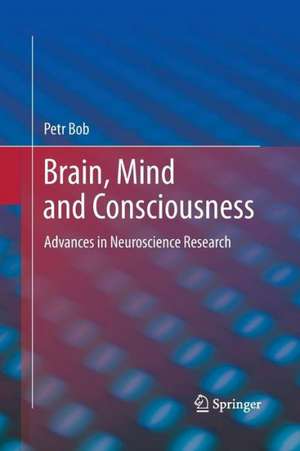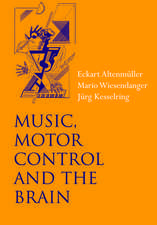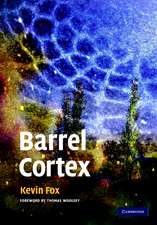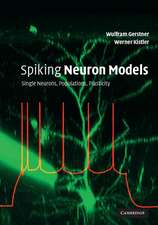Brain, Mind and Consciousness: Advances in Neuroscience Research
Autor Petr Boben Limba Engleză Paperback – oct 2014
Toate formatele și edițiile
| Toate formatele și edițiile | Preț | Express |
|---|---|---|
| Paperback (1) | 633.35 lei 6-8 săpt. | |
| Springer – oct 2014 | 633.35 lei 6-8 săpt. | |
| Hardback (1) | 639.41 lei 6-8 săpt. | |
| Springer – 26 sep 2011 | 639.41 lei 6-8 săpt. |
Preț: 633.35 lei
Preț vechi: 745.11 lei
-15% Nou
Puncte Express: 950
Preț estimativ în valută:
121.23€ • 131.73$ • 101.90£
121.23€ • 131.73$ • 101.90£
Carte tipărită la comandă
Livrare economică 21 aprilie-05 mai
Preluare comenzi: 021 569.72.76
Specificații
ISBN-13: 9781489993823
ISBN-10: 1489993827
Pagini: 152
Ilustrații: VIII, 142 p.
Dimensiuni: 155 x 235 x 8 mm
Greutate: 0.22 kg
Ediția:2011
Editura: Springer
Colecția Springer
Locul publicării:New York, NY, United States
ISBN-10: 1489993827
Pagini: 152
Ilustrații: VIII, 142 p.
Dimensiuni: 155 x 235 x 8 mm
Greutate: 0.22 kg
Ediția:2011
Editura: Springer
Colecția Springer
Locul publicării:New York, NY, United States
Public țintă
ResearchCuprins
1. Brain structures and consciousness.- 2. Binding problem of consciousness.- 3.Consciousness and functional connectivity.- 4. Binding problem and dissociated mind.- 5. The unconscious mind.- 6. Mind and space.- 7. The universe within.
Notă biografică
Petr Bob, Ph.D. is a researcher in psychology and neuroscience at the Center for Neuropsychiatric Research of Traumatic Stress in the Department of Psychiatry at Charles University, Prague. He is the author of recently published book Brain and Dissociated Mind (Nova Science, 2009) and has published numerous articles in prominent medical and neuroscience journals.
Textul de pe ultima copertă
Neuropsychological research on the neural basis of behavior generally asserts that brain mechanisms ultimately suffice to explain all psychologically described phenomena. This assumption stems from the idea that the brain consists entirely of material particles and fields, and that all causal mechanisms relevant to neuroscience can be formulated solely in terms of properties of these elements. Contemporary basic physical theory differs from classic physics on the important matter of how consciousness of human agents enters into the structure of empirical phenomena. The new principles contradict the older idea that local mechanical processes alone account for the structure of all empirical data. Contemporary physical theory brings directly into the overall causal structure certain psychologically described choices made by human agents about how they will act. This key development in basic physical theory is applicable to neuroscience. Brain, Mind and Consciousness: Advances in Neuroscience Research explores this new framework.
Caracteristici
Provides neuroscientists and psychologists with an alternative conceptual framework for describing neural processes. First competitive book focused on the issue of consciousness in connection with theory of chaos, complexity, dissociation, and relativity Develops the problem of consciousness briefly discussed at the end of the author’s previous book Brain and Dissociated Mind, with a focus on the issue of consciousness in connection with dissociation theory, complexity theory, and other physical theories Includes supplementary material: sn.pub/extras
















